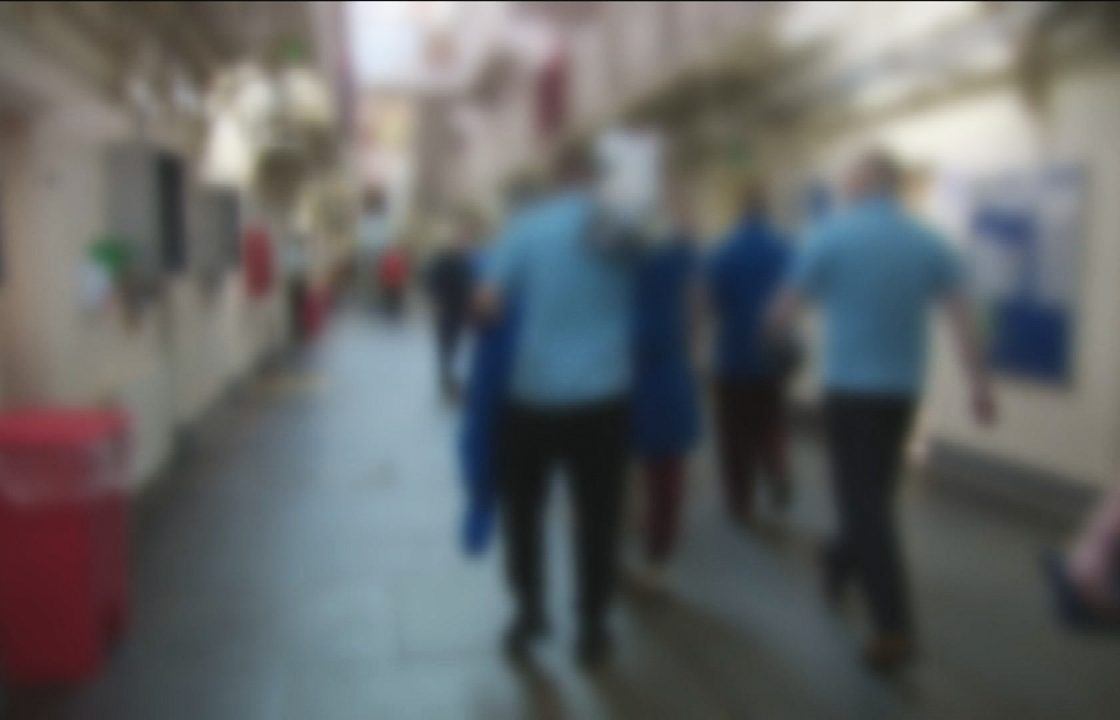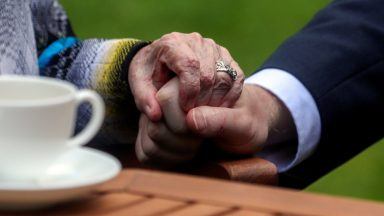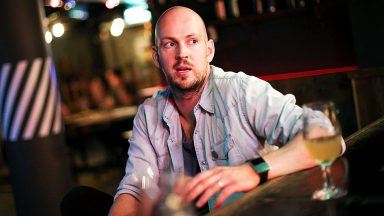Scotland’s prison system has reached its highest population since 2020, chiefs have confirmed.
The Scottish Prison Service (SPS) confirmed it has reached 8,100 as of Monday, April 15 – which is the highest figure since the onset of the coronavirus pandemic.
It’s estimated around 6,500 of the prison population live in overcrowded conditions – with nearly three-quarters (74%) of the estate over capacity.
SPS divisional head James Kerr told STV News: “When a prison is first built, there is an optimum number we would seek to have in that prison.
“That gives us the best balance between giving the prison the best possible chance of delivering outcomes that we require from the prison in terms of rehabilitation and citizenship, but value for money.
“Most of our prisons are abnormally high. There is an abnormal presentation of risk directly related to volume and complexity of prisons. It will become more challenging.”
Scotland’s largest prison, HMP Barlinnie, is designed to hold 987 people, but currently holds around 1,400.
Construction has begun on the £400m HMP Glasgow, which will replace the Victorian jail.
Meanwhile, HMP Inverness is to be replaced with HMP Highland, Scotland’s first net zero prison.
Costing £209m, the facility will be able to accommodate 200 prisoners, over 100 more than the design capacity of Inverness Prison that it will replace.
SPS chief: ‘It’s absolutely a worry’

It comes as inspectors raised concerns about the number of people being held on remand in Scottish prisons.
HM Inspectorate for Prisons in Scotland (HMIPS) believes “too many” people are being detained and the prison estate “is not adequately equipped” to contain the growing population.
The watchdog also said the number of people being handed short sentences is too high and overcrowding is having a negative impact on internal regimes.
Mr Kerr said there are currently around 2,000 people being held on remand awaiting trial in the prison system.
There are also more than 250 people in prison serving sentences at 12 months or less.
Mr Kerr added: “The raw fact is we overpopulate single cells by placing two people in a cell designed for a single person.
“That doesn’t change the size of the kitchen, the health centre, the education facility. All things designed to promote citizenship become harder to reach. It’s absolutely a worry.
“The bottom line is trying to squeeze more people into the same space raises anxieties and frustration. Access to services becomes more challenging as a consequence of that.”
The SPS works with third sector organisations and the Scottish Government to provide education, job opportunities and workshops to help prisoners re-enter society.
But an important part of their work to encourage rehabilitation is being adversely impacted by the rising inmate population.

Kerr said: “We work with people inside custody to try and uncover and mitigate some of the reasons that led to their offending, be it substance misuse, poor prospects, poor education attainment, difficulties in a relationship.
“That investment in them as individuals is about them but also about the rest of us to try to reduce the prospect of future victims.
“Every offence someone is held in prison for, there is at least one victim.”
The Scottish Prison Service runs a budget of more than £400m a year.
Mr Kerr said the government’s approach towards community disposals will help save money, result in better social outcomes and reduce reconviction rates.
“Prison is very expensive. It’s almost a microcosm of society – it’s staffed 24 hours a day, clinical services, food preparation and access to services,” he said.
“It costs around £40,000 a year to keep one person in prison.
“In one prison for people with longer sentences, there are around 500 (prisoners) – added up that’s almost 9,000 years.
“There are people that should be and will remain in prison – that’s absolutely right and proper.
“But we have to ask – is there a better option for people who may have committed an offence (for) which we could give community intervention?
“If you were a person who found yourself in the justice system (in Scotland), you have a higher probability than most other European countries of ending up in prison at the end of that conveyor belt of justice. It’s right that the system asks itself, ‘why is that?'”
Sisco boss: ‘When do we start looking at human rights?’

Natalie Logan is chief executive of Sisco, a criminal justice organisation that supports people in prison and their re-entering into the community.
She described the overcrowding of Scottish prisons as “shambolic and disastrous” and said the government must take action.
She said: “We’re now at a point where the overcrowding is categorically turning into a disaster. If this is not a public health issue then I don’t know what is. When do we start looking at human rights?
“Overcrowding is going to impact on staff members and we won’t be able to give people the therapeutic support they need.
“The consequences are longer waiting lists, potentially not getting support from Sisco at all – just losing their liberation. Being in prison and being churned back out. People are being warehoused.
“If we’re being real, the Scottish Government is failing society. They’re not only failing perpetrators by not giving rehabilitation while they’re in prison, they’re failing the victims. That’s the saddest thing of all.
“The Scottish Government have to take accountability.”
‘You could be waiting years to get rehabilitation’

Ex-offender Scott McFarlane, 33, is a community peer support worker with Sisco.
He got involved after being part of the Prison to Rehab programme, having left HMP Low Moss in East Dunbartonshire to go into the Phoenix Futures rehabilitation centre.
“Prisons are understaffed and overpopulated. They are already at a capacity that staff can’t deal with,” he said.
“You could be waiting years to get on offender-based programmes to receive rehabilitation.
“I’ve personally seen guys serving four, five years, get to the end of their sentence and this nine-month course comes up. You’re out in two months.
“Even sharing a cell with people, if I’m spending 23 hours in a cell with a guy who has a similar mindset to mine, talking about criminality and the stuff we’ve done, our plans when we get out, I’m not rehabilitating.
“I’m making plans to commit more crimes and get involved with stuff. Keeping guys locked up is detrimental to their mental health.
“If you’re keeping someone in that place, in that mindset, nothing is going to change. It will only get worse.”
‘Not fit for the 21st century’
Scottish Conservative deputy justice spokesperson Sharon Dowey MSP said: “This SNP Government’s failed approach to tackling crime is matched by its systemic underfunding of Scotland’s entire justice system.
“While the prison population is rising, Scotland’s Victorian-era prison estate is unable to cope.
“Far too many of Scotland’s jails are simply not fit for the 21st century and in true SNP style both HMP Glasgow and Highland are now way behind schedule and drastically over budget.
“The SNP must get their act together, because the solution to this problem is not just to release more serious offenders on to our streets – which is the premise behind their dangerous Bail and Release Bill.”
Constance: ‘Doing nothing is not an option’
Cabinet justice secretary Angela Constance says the Scottish Government is monitoring the prison estate population “very closely” and that said it had increased in 2023 by 9%.
She said the government is “committed and focused” on reducing the population by using community justice orders and alternatives to remand, such as electronic monitoring and supervised bail.
“I very much recognise the challenges presented by a very high prison population,” Constance told STV News. I’ve made two statements to the Scottish Parliament, outlining the comprehensive action both the Scottish Government and the SPS has taken.
“I’ve been clear that doing nothing is not an option due to the consequences of a high prison population on both prison staff and on prisoners.
“Neither does a high prison population serve our communities, when we know the recidivism rate of people leaving prison having served very short-term sentences is much higher in comparison to people who have completed a robust community justice sentence.
“It’s important we follow the evidence on what works to make our communities safer, first and foremost.
“In terms of action, the Scottish Government is taking, we have made increasing investment both in terms of resource and capital into the SPS to help them deal with the demands placed upon them.

“We’re also investing additional resources into vital community justice services so we can work harder to reduce the remand population, which remains very high. We know that people are spending longer on remand.
“We want to increase confidence and visibility of community justice disposals that are available for our courts.
“As a result of additional investment, we’re also supporting SPS to maximise use of the estate and where appropriate modernise the estate as well.”
She added: “No one is suggesting we are changing our policy on prisons. It’s important that people who commit serious violent offences or people who present a risk to the public or delivery of justice that very often in those circumstances, there is no alternative than a lengthy custodial sentence.
“We do know that any single day will be several hundred prisoners who are serving very short-term sentences [for which] there are better alternatives that will work harder and receive better outcomes both for offenders and the community at large.”
“We need the courage to commit to policies that actually support rehabilitation and make our communities safer. At the end of day we want fewer offences, fewer victims and safer communities.”
Follow STV News on WhatsApp
Scan the QR code on your mobile device for all the latest news from around the country





























